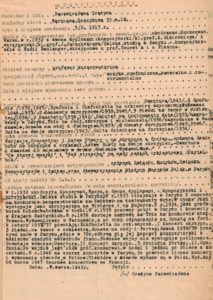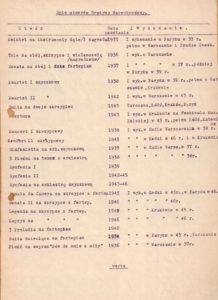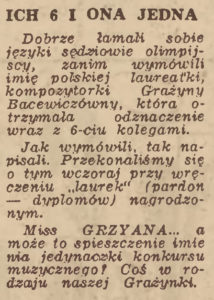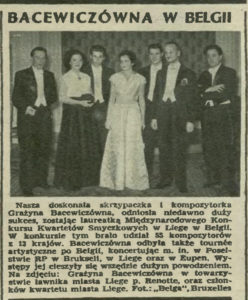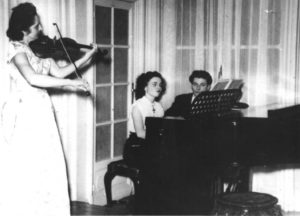Grażyna Bacewicz’s official biography from the first few years after the war may suggest that a world of unlimited possibilities opened up for the her. Soon after returning from Paris, in June 1947 she gave an interview for Ruch Muzycznyin which she described her impression from her stay in the city, formulating her own artistic creed on the occasion. She admitted she had shocked the French critics when she had pointed to Albert Roussel as the French composer she appreciated the most. When recalling a concert featuring a performance of Paul Hindemith’s Mathis der Mahler, she said, “Apart from all the virtues of the piece, what I admire the most is the structure, which for me always comes first [J.K. in conversation with Grażyna Bacewicz, Ruch Muzyczny, 1947 no. 12, pp. 7–9.]. When describing another event, she confessed,
There was a very interesting concert devoted to Bartók and performed by the radio orchestra conducted by Rosenthal. Particularly interesting was the Concerto for String Orchestra [the composer probably meant Divertimento – ed.], in which the ability to use the possibilities offered by string instruments is truly amazing.
This Freudian slip concerning the title of Bartók’s pieces is significant – a few months after the interview the composer wrote her most famous work, Concerto for String Orchestra! The interview ends with a sigh, as it were. When asked, “Did you compose during your stay in Paris?” she replied, “Of course I did. I wrote Quartet No. 3of which I’m proud. There’s something about Paris, something difficult to express in words but conducive to creative work.”
- Grażyna Bacewicz’s personal data form, 1947 (ZKP)
- List of Grażyna Bacewicz’s early works (ZKP)
In the 1940s Grażyna Bacewicz was a figure regarded as being on a par with Roman Palester, Andrzej Panufnik or Witold Lutosławski. People were interested in her achievements as a violinist, but she was also appreciated as a composer. She herself increasingly thought about giving up her career as a violinist and devoting herself to composing. She did not live in isolation and was interested in the life going on around her, especially in the changes in the so-called cultural policy. They were more and more worrying. Between 20 and 29 May 1948 Prague hosted the International Congress of Composers and Music Critics, which formulated the principles of socialist realism modelled on those already in force in the Soviet Union. The congress was accompanied by a music festival, the programme of which featured performances of Witold Lutosławski’s Symphony No. 1 and Grażyna Bacewicz’s Overture.
Grażyna was present in Prague from where on 18 May 1948 she sent quite an enigmatic letter to her brother Witold (Vytautas) in New York:
Dear Brother! I’m in Prague for the Contemporary Music Festival. My Overture was performed today. Great success. Tomorrow I’m playing on the radio. As I’m in a foreign country, I ask you, dearest Vituś, not to be silly with your letters to us, because we’ll end up in prison. What’s more, I ask you not to write about communists, ficios etc., our journey to America etc. All your letters are censored in Poznań. They are opened allegedly because they badly sealed. Lots of love, Gr.
The omnipresent fear prompted caution. Grażyna and her family may have had some concerns because of the situation of her émigré brother with an unregulated legal status. Vytautas, who had been living in the United States since 1940, did not become a permanent resident until the 1970s. On the other hand, Prof Andrzej Biernacki, Grażyna’s husband was well-established in the medical world. In 1948 he was appointed head of the 1st Internal Medicine Clinic and three years later he became member of the Polish Academy of Learning, later transformed into the Polish Academy of Sciences. He was highly regarded as a lung specialist and cardiologist, and organised a network of clinical and research entities. Did her husband’s position save Grażyna from attempts to use her authority for propaganda purposes? It is hard to say. She became an informal First Lady of Polish music and no one wanted to challenge that image. A carnival show organised by medical students in 1949 featured the following poem:
Strange is this twist of fate
and division of honours uneven,
when we hear not that Mrs Biernacka’s played,
but that Bacewicz’s husband his patients treated.
In 1948 Grażyna was awarded an honourable mention at the International Art Competition in London during the first post-war Olympic Games (the gold medal went to Zbigniew Turski for his Olympic Symphony). The same work – a cantata to words by Pindar – won her the 2nd prize at the national art Olympics. Yet the most important works of this very busy year are the Concerto for String Orchestraand Violin Concerto No. 3.
- Press note about the Olympic competition (Życie Warszawy, 1949)
- Press note about the Polish Composers’ Union’s Olympic competition (Głos Ludu, March 1948) (PWM)
Between 5 and 8 August 1949 Łagów Lubuski hosted the National Congress of Composers and Music Critics, which was intended as an honest discussion about the state of Polish music and needs of the public at large. In fact, despite many valuable contributions from various musicians, the congress turned into a propaganda indoctrination exercise featuring the main ideologist of socialist realism, Włodzimierz Sokorski. The deputy Minister of Culture explained to the congress participants what realism in music was and reduced the discussion about works performed during concerts – with considerable help from other participants in the discussion – to the realism-formalism dichotomy.
Accusations of formalism were levelled at e.g. Zbigniew Turski and his award-winning Olympic Symphony.Despite being present, Grażyna Bacewicz did not take active part in the discussion at Łagów. The first and second movements of her Violin Concerto No. 3 were played from tape. Listeners expressed their approval of a noticeable folkloristic tendency, which would become even more evident in later years. And yet her Concerto for String Orchestrais, according to the Łagów criteria, an example of pure formalism! Nevertheless, it received high praise from leading musicologists, including Józef Chomiński. It could be said that Grażyna Bacewicz emerged from all the traps of socialist realism unscathed. However, her attitude towards the new reality was unequivocal, as can be seen in her letters to her brother. But can these letters, which, after all, were censored, be regarded as a touchstone of her views?
She was one of the leading figures of Polish musical life. Already in the 1940s and then also in the 1950s she received numerous awards. In August 1949 she and a group of Polish artists went on a tour of the Soviet Union, during which she played her Violin Concerto No. 3under Veronika Dudarova, Lev Braginsky and Arvid Jansen. She also gave concerts with the brother Kiejstut, receiving excellent reviews. In 1950 she toured Romania, Czechoslovakia and appeared in Budapest, performing her Violin Concerto No. 3under Grzegorz Fitelberg. That period was also a lucky streak when it came to new works. Bacewicz wrote Piano Concerto (1949), Sonata No. 4 for violin and piano (1949–1950), numerous “small” pieces including Polish Capricciofor violin solo (1949), the first (of her two) Obereks for violin and piano (1949), finally String Quartet No. 4, which brought the composer the 1st prize at the International Competition for Composers in Liège, Belgium. The award ceremony became an opportunity to give some concerts in Belgium and France, and the Quartetbecame an obligatory piece at competitions for chamber musicians in Liège (1952) and Geneva (1953).
- Press note on the String Quartet Competition in Liège (Przekrój, 1952)
- Bacewicz in concert after receiving the 1st prize at the Liège Competition (PWM)
Enjoying her successes and receiving praise, Grażyna, while staying in Brussels, did not fail to write a letter to her brother on 1 December 1951:
Dear Witek, as I’m in a place from which I can write honestly, on behalf of the entire family I beg you, don’t write about the ficios [Ficio]. It’s very easy to guess what it means from your last letter. Please, understand that we’re in captivity and a mere trifle can land us in prison at any moment. (…) We’re fine financially, because I earn a lot. Of course, there are many shortages, e.g. of meat (we get small rations once every 10 days), not to mention chocolate and the like. But we’re not bothered by these material shortages. Spiritually, on the other hand, the situation is dire. We often say that it’s good that you’re not in Lithuania or in Poland, because you wouldn’t be able to bear it. (…) We’re also very sorry for Father, because his situation is certainly much worse and he’s on his own.
But the tone of a letter sent from Warsaw on 16 February 1952 is optimistic:
You may have been misinformed about our commissioning system. It’s wonderful and the entire Western Europe is envious. We get money from the government to be able to work in peace. Did Bach write a single piece that hadn’t been commissioned? And I prefer to get money from the state than from an individual. Don’t think that only mass songs are written. I get commissions to write quartets, symphonies, concertos, educational pieces. There may be some tendencies, because the idea is to have more operas and cantatas understandable to the general public, but generally everyone does what they can do.
She wrote Symphonies Nos 2 (1951), 3 (1952) and 4 (1953); Violin Concerto No. 4 (1951); Piano Quintet No. 1 (1952); Oberek No. 2 for violin and piano (1952); Piano Sonata No. 2 (1953), premiered by the composer herself at a concert of the Polish Composers’ Union in Warsaw; Polish Overture for orchestra (1954);Violin Concerto No. 5 (1954) — for the first time a work premiered not by the composer but by Wanda Wiłkomirska; Partita in versions for violin and piano, and for orchestra (1955), as well as many other works. Grażyna Bacewicz’s works were performed at both Polish Music Festivals (1951, 1955). The composer sat on the jury at several international competitions and in 1955 she received the Medal of the 10th Anniversary of People’s Poland. As we can see, she decided to set aside her internal dilemmas for the benefit of her oeuvre. The imperative to work won. This aspect of her personality is accurately described by Grzegorz Fitelberg in his congratulatory letter “Brussels victory” in 1951:
You are a composer, you don’t distort your music, you weave it like a spider weaves its web – instinctively, involuntarily; you compose because you’re unable not to compose. That’s all.
The intensity of her work was interrupted by an accident, which put Grażyna out of active life for a few months. In the autumn of 1954 the family went to Koszelówka to pick up the rest of their things left after the holidays they had spent there. When they were coming back their car, driven by Professor Biernacki, was hit by a lorry, which quickly fled the site of the accident. Grażyna suffered the most and had to spent several months in hospital and then at home, recovering. When friends visited her, she tried to display great fortitude, which they admired, but when her mother asked her what hurt the most, she whispered, “Lower down is the worst, but I will compose, even if I have to use a cane” [Maria Modlińska’s account of 30 September 1954]. And this is what indeed happened. An encouragement to resume working came in the form of an evident “thaw”, also felt in culture, a devaluation of socialist realism, as it were. In a letter to her friend Maria Dziewulska of 21 December 1954 Grażyna wrote:
During my illness I’ve learned to make a distinction between more and less important things. For me those less important ones are all personal or collective ambitions, even a concert that went less than well, the more important ones include persistent, lasting five years, opposition to instructions not to play the so-called formalistic music.
